



"Maui" / ˈ m aʊ i/ respelled as MOW-ee, "metonymy" / m ɛ ˈ t ɒ n ɪ m i/ as meh- TON-im-ee, and "cobalt" / ˈ k oʊ b ɒ l t/ as KOH-bolt are susceptible to being misinterpreted as / ˈ m oʊ i/, / m ɛ ˈ t ʌ n ɪ m i/, and / ˈ k oʊ b oʊ l t/, because of the words "mow", "ton", and "bolt", so only IPA should be provided for such words.

Respelling should also be avoided when a respelled syllable would be the same as an existing word that is pronounced differently. In such cases, an IPA notation is usually nevertheless needed, but not necessarily so see Wikipedia:Manual of Style/Pronunciation § Other transcription systems for further discussion. When citing a homonym, it should not be enclosed in the template. Sometimes another means of indicating a pronunciation is more desirable than this respelling system, such as when a name is intended to be a homonym of an existing English word or phrase, or in case of an initialism or a name composed of numbers or symbols. It should not be used for representing non-English words or an approximation thereof. So, while the IPA is the required form of representing pronunciation, respelling remains optional. On the other hand, the IPA (being designed to represent sounds from any language in the world) is not as intuitive for those chiefly familiar with English orthography, for whom this respelling system is likely to be easier for English words and names. The IPA has significant advantages over this respelling system, as it can be used to accurately represent pronunciations from any language in the world, and (being an international standard) is often more familiar to European/Commonwealth and non-native speakers of English. This does not mean these differences are, or must be, always distinguished if you speak a dialect that does not distinguish "father" and "farther", for example, simply ignore the difference between FAH-dhər and FAR-dhər.įor a more thorough discussion of the sounds and dialectal variation, see Help:IPA/English.Īs designated in Wikipedia:Manual of Style/Pronunciation, the standard set of symbols used to show the pronunciation of English words on Wikipedia is the International Phonetic Alphabet (IPA). That is, we record differences found in some varieties but not in others, such as those between "father" and "farther", "wine" and "whine", and "cot" and "caught". Both the IPA and respelling for English on Wikipedia are designed to record all distinctive sounds found in major varieties of English.


 0 kommentar(er)
0 kommentar(er)
